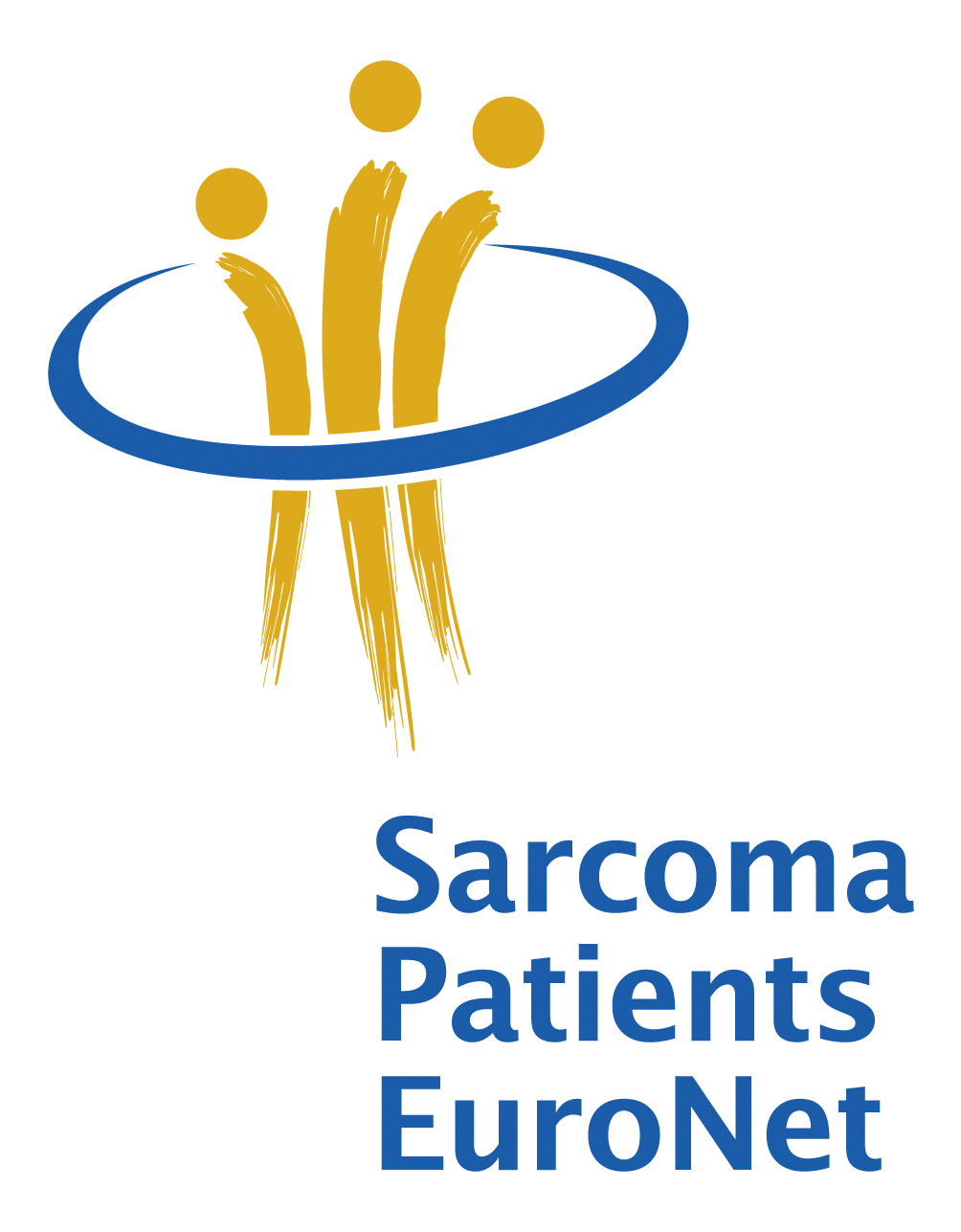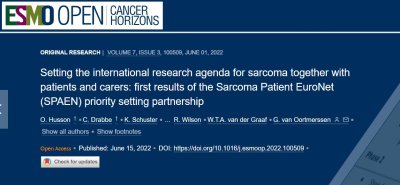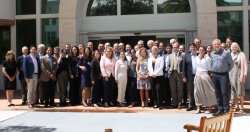- Setting the international research agenda for sarcoma together with patients and carers: first results of the Sarcoma Patient EuroNet (SPAEN) priority setting partnership
Published in ESMO Open, June 2022
|
Research in sarcomas has historically been the domain of scientists and clinicians attempting to understand the disease to develop effective treatments. This traditional approach of placing scientific rigor before the patient’s reality is changing. This evolution is reflected in the growth of patient-centered organizations and patient advocacy groups that seek to meaningfully integrate patients into the research process. The aims of this study are to identify the unanswered questions regarding sarcomas (including gastrointestinal stromal tumors and desmoid fibromatosis) from patient, carer, and clinical perspectives and examine how patients and carers want to be involved in sarcoma research. The first results of this sarcoma Priority Setting Partnership (PSP) identified important research questions, but also important topics for patient advocacy groups and further improvement of information materials. Sarcoma patients and carers have a strong wish to be involved in multiple aspects of sarcoma research. The next phase will identify the top 10 research priorities per tumor type. These priorities will provide guidance for research that will achieve greatest value and impact. |
-
Unmet Medical Needs and Future Perspectives for Leiomyosarcoma Patients — A Position Paper from the National LeioMyoSarcoma Foundation (NLMSF) and Sarcoma Patients EuroNet (SPAEN)
Published in Cancers, February 2021
|
As leiomyosarcoma patients are challenged by the development of metastatic disease, effective systemic therapies are the cornerstone of outcome. However, the overall activity of the currently available conventional systemic treatments and the prognosis of patients with advanced or metastatic disease are still poor, making the treatment of this patient group challenging. Therefore, in a joint effort together with patient networks and organizations, namely Sarcoma Patients EuroNet (SPAEN), the international network of sarcoma patients organizations, and the National LeioMyoSarcoma Foundation (NLMSF) in the United States, we aim to summarize state-of-the-art treatments for leiomyosarcoma patients in order to identify knowledge gaps and current unmet needs, thereby guiding the community to design innovative clinical trials and basic research and close these research gaps. This position paper arose from a leiomyosarcoma research meeting in October 2020 hosted by the NLMSF and SPAEN.
|
- pdf The Management of Desmoid Tumors: A joint global evidence-based consensus guideline approach for adult and pediatric patients (977 KB)
- by the Desmoid Working Group
Now published in the "European Journal of Cancer"
| This paper provides an evidence-based, joint global consensus guideline approach to the management of this disease focusing on: molecular genetics, indications for an active treatment, and available systemic therapeutic options. This paper follows a one-day consensus meeting held in Milan, Italy, in June 2018 under the auspices of the European Reference Network for rare solid adult cancers, EURACAN, the European Organization for Research and Treatment of Cancer (EORTC) Soft Tissue and Bone Sarcoma Group (STBSG), as well as Sarcoma Patients EuroNet (SPAEN) and The Desmoid Tumor Research Foundation (DTRF). The meeting brought together over 50 adult and pediatric sarcoma experts from different disciplines, patients and patient advocates from Europe, North America and Japan. |
- The evolving role of patient advocates in rare cancers: opportunities and challenges
by Ornella Gonzato and Alessandro Gronchi
Expert Review of Pharmacoeconomics & Outcomes Research, January 2018
| The role of Patient Advocates (PAs) has evolved over time. In general, it has expanded ranging from direct support to patients and families to research and public influence. Rare cancers are one of the areas in which PAs are assuming an increasingly more active role as partners with all others stakeholders including healthcare professionals, academics, companies, regulators, and politicians. Because of the rarity, patients face additional difficulties.
Research challenges, access to new drugs and referral of patients to expert centers are the main intervention areas in order to address rare cancer patients needs and improve quality of care. This is the field where PAs role is carried out bringing the patients unique perspective on their conditions and the challenges they face in the rarity.
|
- Patient led PROMs must take centre stage in cancer research
by Roger Wilson, co-founder and honorary president of SPAEN and founder of Sarcoma UK
Research Involvement and Engagement, February 2018
- An update on the management of sporadic desmoid-type fibromatosis: a European Consensus Initiative between Sarcoma PAtients EuroNet (SPAEN) and European Organization for Research and Treatment of Cancer (EORTC)/Soft Tissue and Bone Sarcoma Group (STBSG)
by Christina Baumgarten (SOS Desmoid Germany and SPAEN board member), Jesica Garcia (appointed SPAEN board member) and Professor Bernd Kasper, together with Professor Sylvie Bonvalot, Dr. Rick Haas, Professor Florian Haller, Professor Peter Hohenberger, Dr. Nicolas Penel, Dr. Christina Messiou, Professor Winette van der Graaf and Professor Alessandro Gronchi.
Annals of Oncology, June/October 2017.
| Desmoid-type fibromatosis (DF) is a rare and locally aggressive monoclonal, fibroblastic proliferation characterized by a variable and often unpredictable clinical course. Currently, there is no established or evidence-based treatment approach available for this disease. Therefore, in 2015 the European Desmoid Working Group published a position paper giving recommendations on the treatment of this intriguing disease. Here, we present an update of this consensus approach based on professionals’ AND patients’ expertise following a round table meeting bringing together sarcoma experts from the European Organisation for Research and Treatment of Cancer (EORTC) Soft Tissue and Bone Sarcoma Group (STBSG) with patients and patient advocates from Sarcoma Patients EuroNet (SPAEN). In this paper, we focus on new findings regarding the prognostic value of mutational analysis in DF patients and new systemic treatment options. |
- "The new risk-sharing paradigm in rare cancers: Patient perspective"
by Ornella Gonzato, former SPAEN board member, June 2017
|
Abstract Advances in understanding the biology of rare cancers and in genomic technologies are reshaping drug development and are fostering patients’ hopes because an increasing number of drugs are expected to be made available. However, timely patient access to innovative drugs in rare cancers continues to encounter methodological and regulatory hurdles in an environment more and more characterised by limited resources and health systems under pressure. Decisions on drug pricing and reimbursement often delay access to authorised drugs at national or even regional level. Regulatory and economic issues raise ethical problems. Rare cancer patients have a right to the same quality treatments as all other patients: the higher degree of uncertainty, due to the so-called “intrinsic lack of or defect in evidence” of these diseases, should be addressed by all the different stakeholders to prevent it from being the cause of discrimination against these patients. This challenging goal may be achieved by the adoption of the new ongoing paradigm able to take into consideration both the interdependence of all parties involved, their different drivers and their capability of risk-sharing, starting from the real “core driver,” which can be summarised in the words of a patient: “When you are faced with a rare cancer, you really can’t wait.” |
- "Could information improve patient access to new emerging drugs in rare cancer trials?"
by Ornella Gonzato, former SPAEN board member, May 2016
|
Abstract In these last few years, many efforts have been made by both the scientific and patient communities in the field of rare cancers in order to allow patients access to promising new experimental drugs and to limit discrimination against them. There is a greater sense of urgency about developing and bringing treatments to patients as soon as possible. Rare cancers pose additional, particular challenges if compared with the more common tumours, due essentially to the small numbers of patients involved. Meanwhile, the current regulatory constraints require that the benefit of new drugs be proven in a large number of patients, which is unfortunately impossible, considering the scarcity of numbers.The consequence is therefore an elevated risk of failing to gather enough evidence to obtain the approval for a new drug and, to compound the problem, the development of the drugs themselves is discouraged by the exorbitant costs to the industry of running small trials. How can this scarcity of numbers be overcome in order to allow patients earlier access to the new therapies? There are, essentially, two ways: one involves working on the methodology with which clinical trials are conducted, reducing the stringent limitations connected with numbers. The second way is to organize large-sized clinical trials. In both of these methodologies, patient informationis crucial. |
- “Management of sporadic desmoid-type fibromatosis: A European consensus approach based on patients’ and professionals’ expertise – A Sarcoma Patients EuroNet and European Organisation for Research and Treatment of Cancer/Soft Tissue and Bone Sarcoma Group initiative”
January 2015, currently in revision
|
Abstract Desmoid-type fibromatosis (DF) is a rare monoclonal, fibroblastic proliferation characterised by a variable and often unpredictable clinical course. It may affect nearly all parts of the body including extremities, trunk and abdomen. Considering the variable clinical presentations, anatomic locations and biological behaviours, an individualised treatment approach is required. No established or evidence-based approach for the treatment of this neoplasm is available as of today. Therefore, we propose a consensus treatment algorithm based on a round table meeting bringing together sarcoma experts from the European Organisation for Research and Treatment of Cancer (EORTC) Soft Tissue and Bone Sarcoma Group (STBSG) with patient advocates from Sarcoma Patients EuroNet (SPAEN). The aim of the meeting was to develop - for the first time ever - a consensus approach based on professionals' AND patients' expertise. As a fundamental prerequisite, all patients should be discussed in a multidisciplinary setting in centres or professional networks with a specific expertise in the disease. |
- Rare Cancers Europe (RCE) methodological recommendations for clinical studies in rare cancers: a European consensus position paper
October 2014
|
Abstract While they account for one-fifth of new cancer cases, rare cancers are difficult to study. A higher than average degree of uncertainty should be accommodated for clinical as well as for population-based decision making. Rules of rational decision making in conditions of uncertainty should be rigorously followed and would need widely informative clinical trials. In principle, any piece of new evidence would need to be exploited in rare cancers. Methodologies to explicitly weigh and combine all the available evidence should be refined, and the Bayesian logic can be instrumental to this end. Likewise, Bayesian-design trials may help optimize the low number of patients liable to be enrolled in clinical studies on rare cancers, as well as adaptive trials in general, with their inherent potential of flexibility when properly applied. While clinical studies are the mainstay to test hypotheses, the potential of electronic patient records should be exploited to generate new hypotheses, to create external controls for future studies (when internal controls are unpractical), to study effectiveness of new treatments in real conditions. Framework study protocols in specific rare cancers to sequentially test sets of new agents, as from the early post-phase I development stage, should be encouraged. Also the compassionate and the off-label settings should be exploited to generate new evidence, and flexible regulatory innovations such as adaptive licensing could convey new agents early to rare cancer patients, while generating evidence. Though validation of surrogate end points is problematic in rare cancers, the use of an updated notion of tumor response may be of great value in the single patient to optimize the use of therapies, all the more the new ones. Disease-based communities, involving clinicians and patients, should be regularly consulted by regulatory bodies when setting their policies on drug approval and reimbursement in specific rare cancers. |




